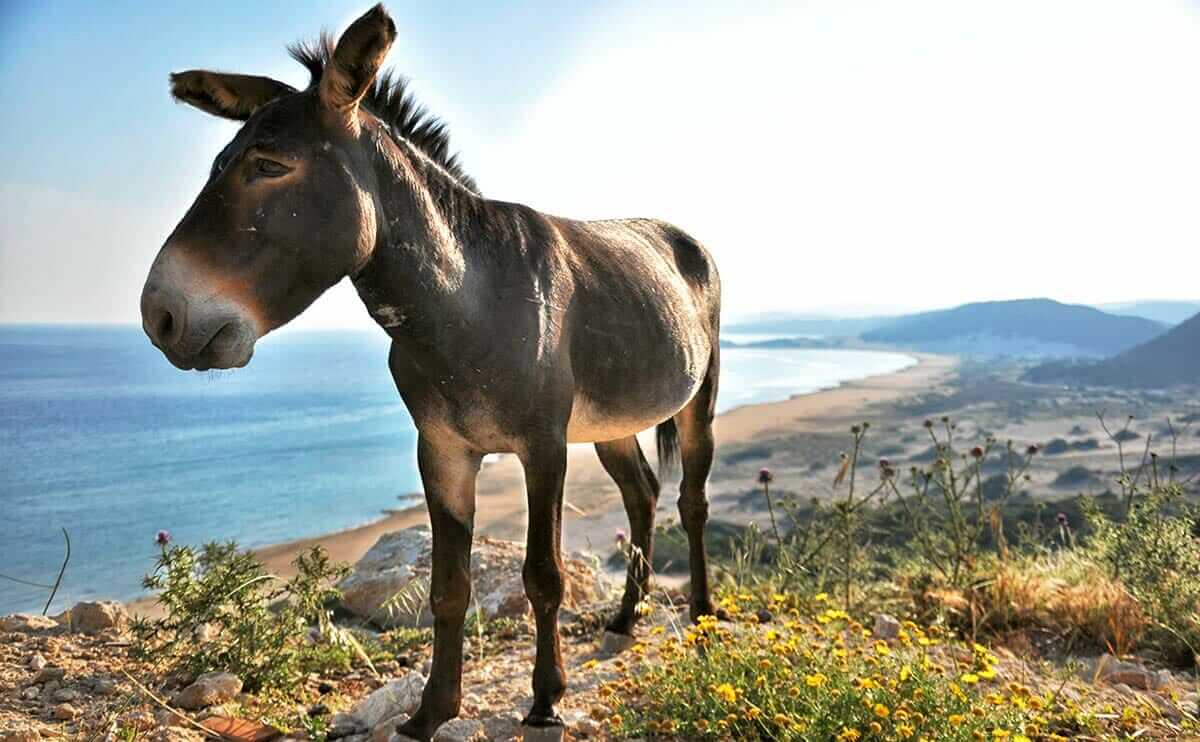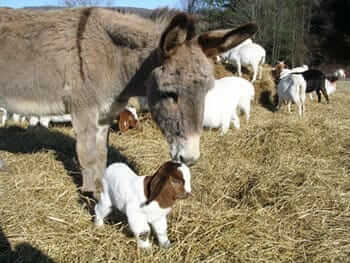Modern Farmer’s Guide to Guard Donkeys
Are coyotes stealing your sheep? Maybe you need a guard donkey.
Modern Farmer’s Guide to Guard Donkeys
Are coyotes stealing your sheep? Maybe you need a guard donkey.

Although often portrayed as moody and difficult to work with, donkeys, if trained right, can be loyal and effective farm hands that are naturally inclined to not only herd but also protect sheep and goats from predators such as coyotes and roaming dogs.
Jan Dohner, author of “Livestock Guardians: Using Dogs, Donkeys and Llamas to Protect Your Herd,” and several other articles about guardian donkeys, says these equines make great livestock protectors but are quite different than your standard farm dog.
‘Donkeys can’t handle the same predators as dogs, but they also won’t keep you up all night barking.’
“Donkeys can’t handle the same predators as dogs and they won’t protect your farm against small pests like raccoons or birds, but they also won’t keep you up all night barking,” she says.
Like most guardian animals, it is best to raise donkeys with the herd they’ll be protecting while they are young. Although jennies (female donkeys) or gelded males can be introduced to a herd as grown animals, foals that grow up with their flock will be natural leaders and protectors.
Donkeys are territorial animals and are not necessarily protective of the herd as much as they are protective of their territory and themselves. They do not patrol the pasture but rather feed and socialize with the stock until a threat appears. With their large ears and a wide range of vision, donkeys are alert while grazing yet are less spooky and skittish than horses, making them more likely to stand their ground and confront a threat.

Dohner says donkeys are instinctually aggressive toward canines, and are capable of dishing out crushing blows with both their front and hind legs as well as using their large teeth to bite raiding intruders. However, they cannot handle multiple canine attackers or larger predators like mountain lions, wild hogs or bears, and will rarely notify the farmer of any problems in the pasture — although their loud braying may indicate potential invasions.
Although not very popular with larger commercial farms, Dohner says donkeys are a good alternative for hobby farms or those who operate their business out of their farm.
“For people who aren’t comfortable with big, aggressive guard dogs, donkeys are a good option, they offer more protection against predators than llamas and are better with visitors or customers than dogs.”
However, not every donkey will make a suitable guardian for your farm. Jacks, or intact male donkeys, are generally too rough with sheep and may harm or even kill livestock. Similarly donkeys with no prior contact with livestock may act aggressively when placed in the same pasture.
Kim Barnes, operations manager at The Donkey Sanctuary of Canada, works with donkeys everyday and cautions that farmers who choose to use donkeys as livestock guardians need to know how to both handle and take proper care of them.
‘Donkeys are loyal, affectionate and great at what they do, but they are not just a piece of equipment.’
“Donkeys are loyal, affectionate and great at what they do, but they are not just a piece of equipment,” she says. “There is no reason they cannot be great guardians, but people thinking about getting a donkey for this reason need to do the research.”
So next time you see a donkey lazily grazing in the sun, remember, that’s no Eeyore moping around the pasture, it could very well be farm security, in which case you better watch out because you do not want to be on the receiving end of a donkey kick.
Follow us

This work is licensed under a Creative Commons Attribution-NoDerivatives 4.0 International License.
Want to republish a Modern Farmer story?
We are happy for Modern Farmer stories to be shared, and encourage you to republish our articles for your audience. When doing so, we ask that you follow these guidelines:
Please credit us and our writers
For the author byline, please use “Author Name, Modern Farmer.” At the top of our stories, if on the web, please include this text and link: “This story was originally published by Modern Farmer.”
Please make sure to include a link back to either our home page or the article URL.
At the bottom of the story, please include the following text:
“Modern Farmer is a nonprofit initiative dedicated to raising awareness and catalyzing action at the intersection of food, agriculture, and society. Read more at <link>Modern Farmer</link>.”
Use our widget
We’d like to be able to track our stories, so we ask that if you republish our content, you do so using our widget (located on the left hand side of the article). The HTML code has a built-in tracker that tells us the data and domain where the story was published, as well as view counts.
Check the image requirements
It’s your responsibility to confirm you're licensed to republish images in our articles. Some images, such as those from commercial providers, don't allow their images to be republished without permission or payment. Copyright terms are generally listed in the image caption and attribution. You are welcome to omit our images or substitute with your own. Charts and interactive graphics follow the same rules.
Don’t change too much. Or, ask us first.
Articles must be republished in their entirety. It’s okay to change references to time (“today” to “yesterday”) or location (“Iowa City, IA” to “here”). But please keep everything else the same.
If you feel strongly that a more material edit needs to be made, get in touch with us at [email protected]. We’re happy to discuss it with the original author, but we must have prior approval for changes before publication.
Special cases
Extracts. You may run the first few lines or paragraphs of the article and then say: “Read the full article at Modern Farmer” with a link back to the original article.
Quotes. You may quote authors provided you include a link back to the article URL.
Translations. These require writer approval. To inquire about translation of a Modern Farmer article, contact us at [email protected]
Signed consent / copyright release forms. These are not required, provided you are following these guidelines.
Print. Articles can be republished in print under these same rules, with the exception that you do not need to include the links.
Tag us
When sharing the story on social media, please tag us using the following: - Twitter (@ModFarm) - Facebook (@ModernFarmerMedia) - Instagram (@modfarm)
Use our content respectfully
Modern Farmer is a nonprofit and as such we share our content for free and in good faith in order to reach new audiences. Respectfully,
No selling ads against our stories. It’s okay to put our stories on pages with ads.
Don’t republish our material wholesale, or automatically; you need to select stories to be republished individually.
You have no rights to sell, license, syndicate, or otherwise represent yourself as the authorized owner of our material to any third parties. This means that you cannot actively publish or submit our work for syndication to third party platforms or apps like Apple News or Google News. We understand that publishers cannot fully control when certain third parties automatically summarize or crawl content from publishers’ own sites.
Keep in touch
We want to hear from you if you love Modern Farmer content, have a collaboration idea, or anything else to share. As a nonprofit outlet, we work in service of our community and are always open to comments, feedback, and ideas. Contact us at [email protected].by Tyler LeBlanc, Modern Farmer
June 3, 2014
Modern Farmer Weekly
Solutions Hub
Innovations, ideas and inspiration. Actionable solutions for a resilient food system.
ExploreExplore other topics
Share With Us
We want to hear from Modern Farmer readers who have thoughtful commentary, actionable solutions, or helpful ideas to share.
SubmitNecessary cookies are absolutely essential for the website to function properly. This category only includes cookies that ensures basic functionalities and security features of the website. These cookies do not store any personal information.
Any cookies that may not be particularly necessary for the website to function and are used specifically to collect user personal data via analytics, ads, other embedded contents are termed as non-necessary cookies.
I leave in Canada BC l am a naturalized Canadian of portuguese origin
Most of my relatives leave in Portugal and some are farmer
One of my nephews raises lamb
Last month he lost more than 50/% of his production to astray dogs
I talled him about guard donkeys something he had never heard before
Your article about security farm donkeys is very interesting
I would love to know more about these animal and if there is a breed that is more naturally inclined to be used as guard donkey
Thank you
Antonio Ribeiro
Hello my name is gavin I own a small goat farm . I have two gaurd donkeys that stay with my goats , since I have bought them I have not lost one goat adult or kid to predators !!!! I have had them for a year now both donkeys was 9 months old when I got them on 3 different occasions I have found them playing with dead coyotes they pick them up and pack them around like a toy lol.also my nieghbors pesky dogs don’t come around anymore to chase my heard . My farm is just north… Read more »
Hai sir am from India Tamilnadu I would like to shelter donkeys in the southern part of the country . What should be the next step I take before proceeding to adopt them
Enjoyed the comment on a donkey.
Bought one today for my small cow herd.
just acquired a jenney(8yrs)and foal(jack)5 months..NO halters…would halters help…am starting the socialization with goats(hyper of course)what should I expect and how can I improve the next few weeks?
How about Donkeys with Geese. Coyotes have come over my 6 foot wall over and over to devestate my flock of Adult Geese killing half of them over the last couple months.
Can a standard donkey be a guardian for miniature donkeys?
In the past month I acquired a flock of 7 dairy ewes and 1 Nubian dairy goat. I already had my mini donkey (intact male) who was used to my flock of wool sheep before I sold them. He has taken to these sheep and goat just fine and everyone seems to be in harmony. I need to breed my goat this fall and want to bring a buck home. I have met this buck and he has the same sweet curious personality as my goat. Do I need to put the buck in a separate pasture from the donkey… Read more »
My neighbor’s animals were separated but someone opened the pasture when they were not supposed to. 4 month old male donkey got out and was attacked today by gelding adult male guard donkey, the adult male picked the baby donkey up by his neck with his teeth and shook him. Baby donkey has weakness in the neck muscles, trouble raising his head, and lack of sensation in the front legs, his ankles buckle slightly when standing. He is able to stand but motor control is affected in the front legs. I am suspecting a cervical nerve root injury affecting the… Read more »
Help!
We got a Jenny and we are trying to introduce her to out herd of 100 sheep and she is chasing and herding them. Is she doomed? Are we?